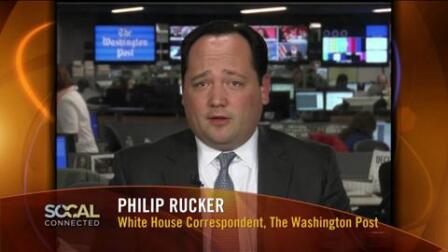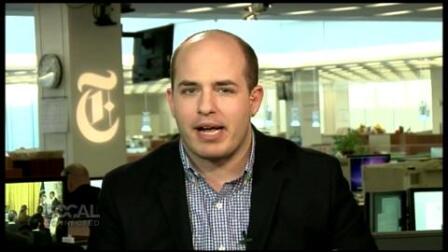End of the World Is Big Business for Shelter Builders
Don't look now. But if the Mayan calendar is right, the end of the world is "rapidly" approaching! You probably find that ridiculous, but some of your neighbors don't. They take it so seriously, they've literally gone underground -- spending big money on state-of-the-art "buried" shelters. And they're not alone.
TRANSCRIPT
Vince Gonzales/Reporter: When you think about the "end of the world," you might remember the Cold War balance of terror -- the government films that traumatized generations of school children...
[Voiceover on Film Clip]: These children are practicing to duck and cover just as you do in your school.
Gonzales: ...and their questionable advice on how to survive a nuclear blast.
[Voiceover on Film Clip]: But there may not be any grownups around when the bomb explodes. Then you're on your own. Remember what to do, friends. Now tell me right out loud, what are you supposed to do when you see the flash? Duck and cover!
Gonzales: Maybe Hollywood shaped your vision of the end times...
Charlton Heston ["Planet of the Apes" Clip]: You maniacs! You blew it up! Damn you! God damn you all to hell!
Gonzales: ...from Charlton Heston's revelation in 1968's "Planet of the Apes" to the recent wave of disaster movies like "2012" and "The Day After Tomorrow." Or perhaps you've immersed yourself in all the new programs detailing a Mayan prophecy that supposedly says the world will end this week.
Man on TV: Am I nuts, or are you?
Gonzales: Or seen other programs that focus on the people preparing for that scenario, and a long list of other disasters.
People on TV: There's all kinds of dangers. Earthquakes. Catastrophic collapse. Super volcanoes. Total destruction. EMP. Terrorist attacks. It's the end of the world as we know it.
Gonzales: Ironically, all the recent talk of "the end of the world" has sparked a building boom. Depending on whose estimate you believe, in the last two years sales of shelters have jumped five hundred to a thousand percent. Sales of survival gear, storable food, and guns are also surging.
Ron Hubbard/Atlas Survival Shelters: Come on in, Vince. So, the way this works is we just came through a decontamination room. So if I have to lock the shelter down, I can latch it down like this, and when I have the weather stripping in, hear the sound change? We have an airlock in here now.
Gonzales: Ron Hubbard used to make decorative iron doors. He founded Atlas Survival Shelters in Montebello and entered the underground economy.
Hubbard: A year ago, I was selling maybe a shelter a month. Then earlier this year, it went to almost a shelter a week, but ever since the election, it's gone to at least a shelter a day. That was kind of like the straw that broke the camel's back.
Gonzales: Ron's models go from small, backyard shelters to monsters like this one with water tanks, air filtration systems, food storage, and more.
Hubbard: When you come in you got a flushing toilet. You got a shower with a bathtub. You got a vanity, and then, immediately, you come around the corner and this is what we call the "bunk room." This is for six people. Six adults.
Gonzales: And don't forget the living room. This is not what people think about when they think about a shelter.
Hubbard: No, when you walk in here you're like: Oh, my god, look at the size of this living room. This is 220 square feet of living room, underground. This one has a mahogany electric fireplace for the ambiance. You've got a big screen TV. You got a fridge. You got a microwave. You got a kitchen here.
Gonzales: Given enough supplies, Ron claims you could bunker down here for a year without opening the doors. But he says his shelters have more to do with recreation than Revelations. He calls them "underground homes."
Hubbard: People look forward to coming to the shelter, especially when they're kids; you should see the glow on the faces of the children when they come down here. To them, this is a fort. It's like a playhouse. Kids love this. They think it's the funnest thing.
Gonzales: The cost: from the factory floor to buried 20 feet underground on your property. A shelter like this can set you back almost $150,000. And sales are good. The day we were visiting another finished bunker was loaded up and shipped out.
Hubbard: Were you guys interested in a shelter in Georgia?
Gonzales: But Ron admits his buyers, who are all over the country, have a lot more on their minds than recreation. He says his customers, normal citizens, military officers, politicians, corporate CEOs, worry about a litany of potential disasters.
Hubbard [on phone]: When where you trying to get this shelter in the ground?
Gonzales. Everything from the fiscal cliff, to a pandemic, to President Obama coming for their guns, to the Mayan prophecy.
Hubbard: Nothing will probably happen or 98 percent of us will be killed. It's either/or. Ok?
Gonzales: So are you going underground?
Hubbard: I'm going underground December 19th, and I'm coming out the 23rd. It would be silly for me not to be in my shelter just in case.
Gonzales: But Ron says he's not preying on his customers' fears. He compares his shelters to buying an insurance policy.
Hubbard: Do we want a fire? Do we want a hurricane? No. Do we want a nuclear disaster? Do we want a chemical attack? No! But what other kind of insurance can you buy other than this thing right here? You can't buy anything else. So, if you've got the money this is the only insurance policy that you can buy in this world to protect yourself. It is better to have a shelter and be 10 or 15 years early than be one second late.
Gonzales: Despite the high price of a refuge like this, with all the amenities, and the question of whether you could make it to your shelter in time in a true global disaster, we spoke with consumers who bought shelters like this one, or who purchased one from a similar such venture, who told us they were a necessary investment.
Kramer: We saw it as a tremendous value. That was our perspective.
Gonzales: South Bay resident Steve Kramer says his son came home from school concerned about the Mayan prophecy. That brought back his own fears from growing up during the cold war. So, to ease his son's mind, they started doing research, going online and on the road.
Kramer: We actually went down to Chichen Itza and saw the Mayan ruins and Tulum, and talked to some of the tour guides there. We tried to talk to some of the elders, but they were very hard to be able to approach.
Gonzales: He did find another solution: Vivos. A Southern California company that says it can save your family from a variety of disasters. Vivos offers high-end, luxury survival communities, and what the company calls "your place in the new genesis." Steve paid over $100,000 to buy into a Vivos shelter for his family.
Kramer: It wasn't mostly the fear that drove me. I saw it almost as a responsibility to survive, and that's how I look at it. It's almost like a mission. Same with a lot of the people that get involved in this. They see it as a responsibility to carry on our civilization as we know it. I mean, it's not a savory thought, and hopefully it's not going to come to pass within our lifetimes, but it certainly needs to be addressed. How are the seeds of our existence going to be passed on?
Gonzales: Steve says he and his family are also considering going into their bunker before the 21st of December. And he knows what some people think about shelter sellers and buyers.
Kramer: If people think I'm crazy that's fine.
Gonzales: But he says those attitudes are changing. In the beginning when I first talked to people they raised their eyebrows, you could see them whispering. You knew they really thought we were in left field out there somewhere. And now, people are interested. It's in the public psyche. People are not looking at it like it's such a crazy thought anymore. They look at it like i wish i had the money to do that. Or I wish that my wife would let me buy one of those.
Professor Stephen O'Leary/USC: In Los Angeles, there are earthquakes, there's the possibility of civil unrest, there's food chain disruptions. These are things which actually could happen. It's not farfetched at all. So in that sense, it's totally reasonable to stack up on supplies.
Gonzales: Professor Steven O'Leary of the University of Southern California has been studying apocalyptic prophecies, survivalists, and doomsday preppers for decades.
O'Leary: It's very, very important we don't look at these people and say, What irrational idiots these people are." There is a rational core, but it's mixed in with some very irrational beliefs. Preparing for disaster, that is reasonable. Worrying about Obama being the antichrist, or worrying about the United Nation troops coming to take your guns, I don't think that's reasonable.
Gonzales: And O'Leary says it's not hard to have your point of view stretched to the extreme.
O'Leary: You could say all of these prophecies, what they do is they take the natural emotions that we feel about the future, which are hope and fear. You know we are afraid something bad may happen, and you maximize those emotions and cube them to the nth degree. It's the ultimate hope or the ultimate fear.
Gonzales: And that fear can give all the talk of shelters a darker edge. Take this comment from Ron Hubbard, echoing something we heard a lot in the shelter-survival community.
Hubbard: If you close the hatch, that means we are experiencing civil unrest with zombies out there, chemical warfare, biological warfare, nuclear fallout, which all four of those will kill you.
Gonzales: You heard right. Of the four threats Ron cited, zombies are on the list, but he doesn't mean this kind of zombie [zombie clip]. He means the rest of us. To him, people who didn't invest in a shelter are a potential threat.
Hubbard: When I hear people mention zombies, I don't think of the walking dead, like the television series. I think of the people who aren't prepared, because they don't think anything can happen. They're gonna be looking around for the government to give them food and water, but the government is not going to be there. No one is going to be there.
O'Leary: The zombies will be knocking on your door and they may not want to eat your brains, they want to eat your freeze-dried rice. I think there is almost a vindictive edge. There is also a sort of glee in the possibility of catastrophe. Hollywood has given us the pleasure of attack. Every one of these movies has iconic monuments: the Status of Liberty, the White House, Golden Gate Bridge. They are totally broken up by matchsticks. And for some reason we like that.
Gonzales: To Steve Kramer, this all misses the point. He hopes he is wasting his money.
Kramer: We're not purveyors of doom and gloom at all. I am the most optimistic guy. I love life. And most of the people that are members are too. We're not downers. We're just aware of a lot of the things that exist that are out there.
Gonzales: Would you be happy to pass to the end of your days without using this option?
Kramer: Oh, absolutely. I'm hoping. Absolutely, but I wouldn't count on it.






















